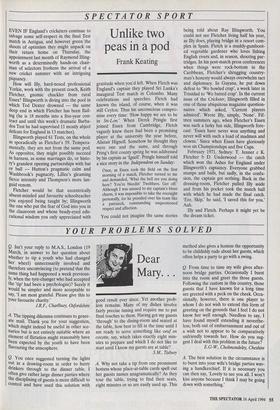YOUR PROBLEMS SOLVED
Q. Isn't your reply to M.A.S., London (19 March, in answer to her question about whether to tip a youth who had changed her wheel) unnecessarily involved and therefore unconvincing (to pretend that the same thing had happened a week previous- ly, when the tyre-changer who had accepted the 'tip' had been a psychologist)? Surely it would be simpler and more acceptable to say, am most grateful. Please give this to your favourite charity.'
IR.F., Charibray, Oxfordshire A. The tipping dilemma continues to gener- ate mail. Thank you for your suggestion, which might indeed be useful in other sce- narios but is not entirely suitable where an element of flirtation might reasonably have been expected by the youth to have been flavouring the atmosphere.
Q. You once suggested turning the lights out in a drawing-room in order to hurry drinkers through to the dinner table. I often give rather large dinner parties where the disciplining of guests is more difficult to control and have used this solution with good result ever since. Yet another prob- lem remains. Many of my dishes involve fairly precise timing and require me to put final touches to them. Having got my guests `through' to the dining-room and seated at the table, how best to fill in the time until I am ready to serve something like oeuf en cocotte, say, which takes exactly eight min- utes to prepare and which I do not like to start until I know my guests are at table?
S.M., Tisbury A. Why not take a tip from one prominent hostess whose place-at-table cards spell out her guests names anagramatically? As they tour the table, trying to find their seats, eight minutes or so are easily used up. This method also gives a hostess the opportunity to be childishly rude about her guests, which often helps a party to go with a swing.
Q. From time to time my wife gives after- noon bridge parties. Occasionally I burst into the room and greet the three guests. Following the custom in this country, those guests that I have known for a long time are greeted with a peck on the cheek. Occa- sionally, however, there is one player to whom I do not wish to extend this form of greeting on the grounds that I feel I do not know her well enough. Needless to say, I have found myself extending it neverthe- less, both out of embarrassment and out of a wish not to appear to be comparatively unfriendly towards her. How do you sug- gest I deal with this problem in the future?
E.G-W., Cholmondeley, Cheshire A. The best solution in the circumstance is to burst into your wife's bridge parties wav- ing a handkerchief. If it is necessary you can then say, 'Lovely to see you all. I won't kiss anyone because I think I may be going down with something.'


























































 Previous page
Previous page